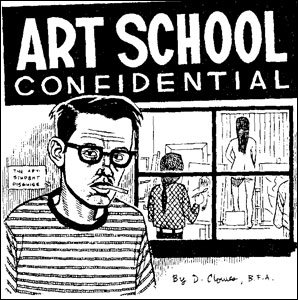 "Don't have unrealistic expectations. Only one student out of a hundred will find work in his chosen field," intones a teacher played by John Malkovich. "The rest of you are essentially wasting your time learning a useless 'hobby'." This is a line from the new film, Art School Confidential.
"Don't have unrealistic expectations. Only one student out of a hundred will find work in his chosen field," intones a teacher played by John Malkovich. "The rest of you are essentially wasting your time learning a useless 'hobby'." This is a line from the new film, Art School Confidential. The other morning, I caught NPR's interview with Daniel Clowes, the screenwriter of Art School Confidential, which explores art school and the whole concept of making your living as an artist -- as he put it, "the emotional landscape of being an artist, with all its pitfalls." Daniel Clowes is a comic and screenwriter, so his picture of being a commercially successful artist is slightly different than others, but there are striking similarities too. Listening to him talk about himself and his work, I couldn't help but find myself drawn into the discussion.
For the record, I don't consider myself a commercial artist. If pressed, I guess I would call myself an artisan -- meaning I have perfected a craft, and I replicate and produce goods using this method. I don't create one-of-a-kind pieces which portray my personal vision in a given medium. Yet the thought process for imagining my products follows a similar creative path. This company is my own personal vision and reflection. So in a slightly larger, broader sense, the shoe fits.
The way in which I sell my goods puts me in the same commercial arts shows and festivals as fine arts artists. We all set up together under the same tents and market our little handmade labors of love to the public. While some artists are searching for the right galleries, others are searching for the right retail outlets. All of us are trying to utilize the latest tools and trends (i.e., internet, technology) as a way to make our work financially successful and commercially viable. It's a tightrope, and often scary.
Another little audio clip from the film: "What do artists think about? ..... he lives only for that narcotic moment of creative bliss!" I laughed out loud at this. Because while it's completely ridiculous and stereotypical absurd, it's absolutely true in some sense. When it comes right down to the very source, the one little gizmo that holds this whole ship together? it is truly that moment when the sparks begin to fly, the little gears spin wildly and new ideas are born. The times when I'm totally bogged down by paperwork, exhaustion, business issues, day-to-day aggravations, if I can put all that aside and get back to the moment of coming up with a new idea -- new fragrance, new packaging idea, new product altogether, some big thing to change or do differently? That's where the joy lies, and I remember why I am still doing this ten years later.
When asked what he really thinks about, Daniel Clowes talked about how he obsesses over "the purity of what I'm doing. Am I guided by principles that lead me to do only my most personal distinctive work? Or am I making changes, that perhaps I'm not even aware of, that are designed to appeal to a marketplace or an audience?"
He's articulated a very important point for a lot of us, I think. The distinction for me, however, is that by design I really need to appeal to an audience and marketplace. But while I draw my line in the sand a little differently than some artists, I am still very much fighting the tug of war between doing what I think best represents me and my own viewpoint, and just doing what I think the marketplace wants me to do. I think when you sell something, anything, you are creating a vision that people relate to themselves. To me, it makes more sense to choose an audience that follows your own aesthetic, style and ethics, rather than trying to appeal to a completely unfamiliar marketplace. And since I have chosen to keep this business very small and intimate, I also do not need to attempt to appeal to the broad-based general public. While I don't want to limit myself too much, I also don't need to market myself as the next Wal-Mart or Costco either.
So, 10 years into this thing -- I actually am the '1 out of 100' who are making a living from my so-called art. This is not what I went to school for. Or what I dreamed of when I was younger. It just sort of popped up suddenly, and has evolved into this "what I do for a living" business. I am much more drawn to the 'artist' mindset than I am the entrepreneurial businessman mindset. So I'm very much looking forward to seeing this film and having a few laughs over the lampooning of art as business.
The interview is on NPR's website -- where you can listen to the actual interview and find out more.
No comments:
Post a Comment